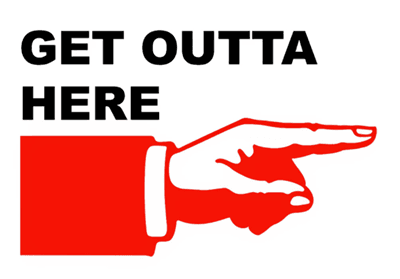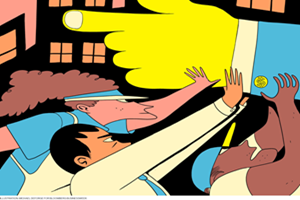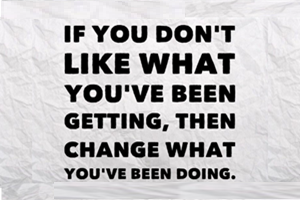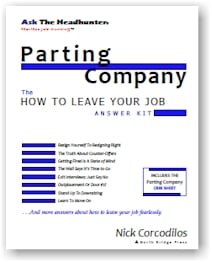In the January 8, 2019 Ask The Headhunter Newsletter a reader wants to quit or get fired.
Question
If a person has a choice, what’s better — to quit a job or get fired?
Nick’s Reply

Some suggest that the answer is obvious — quitting is better because then you won’t have a record of being fired. Who wants to say they got fired or terminated? And who wants to explain why they got fired?
I think what’s better is not so clear. Here are a few things to consider. (Please note that we’re assuming that if you got fired, it was not for truly egregious or illegal behavior.)
The sucker punch
Some companies that want to fire you will “give you the opportunity to resign instead,” implying they’re doing you a favor. It’s a common pitch offered by an HR manager. But it can be a sucker punch, especially if you’re losing the job through no fault of your own; for example, the company is experiencing a downturn.
In all of the 50 United States, if you quit your job you likely forego unemployment benefits because you chose to leave. When you quit, the employer saves money. According to NOLO, whether you can collect unemployment may depend on the reason you quit. (Unemployment Benefits: What If You Quit?) That can be a hefty price for quitting.
I might prefer to get fired if I have a choice, and that’s not just because I might lose unemployment benefits.
What’s on your record?
Many people shudder at the thought of having “fired” on their record. But that record is not public or easily accessed. An employer that fired you is usually loathe to disclose it during a reference check for fear of getting sued. So I’m not sure your record will be a problem.
However, if you got fired because you did something really bad, or because you did a truly lousy job, you have a very different problem — a bad reputation. A bad rep will grow and grow and follow you around. Employees with bad reps may not be exposed via formal reference checks, but back-channel chatter about them will likely circulate.
A badge of honor
Some employers are known to be terrible places to work. Getting fired can be a badge of honor. Emotionally, it might even be empowering. And it might even signal to a competitor that you’re a nice catch!
If you’re going to explain being fired, keep it brief and focus on what you can do to help the new employer — and why you are worth hiring. But don’t worry so much about getting fired. It’s not the end of the world. See Fired for my ethics!
Notice the time
If you get fired, your job is usually instantly over. If you quit, you likely are stuck with giving two weeks’ notice. Notice the difference. That’s time you could spend looking for a job you really want, or time on vacation to regroup. I’m not suggesting you go out of your way to get fired — but if you don’t really want to quit your job, don’t let getting fired scare you.
Legal recourse
If you quit a job, it’s your choice. If you are unwillingly terminated, you may have legal recourse. For example, the action may in fact have been discriminatory or it may have been done in violation of some law or written company policy.
If you’re going to get fired, consult an attorney. Know your rights. You might not have that option if you quit.
Why did you get fired?
People who get fired usually fear being asked why they left their last job. What if you have to admit you were fired? (See How much should I say about getting fired?)
First, you don’t have to admit anything. (Of course, you should not lie. Declining to answer a question is not lying.) Why you left a job is private — and I think that’s a legitimate answer.
But, “Whoa, there!” an uninitiated and naive career coach will shout. “If you don’t answer the question, an employer will find it suspicious and reject you!”
It’s a matter of how good you are at declining to answer and shifting the discussion to what really matters. For example, your abilities and your references:
“I’d prefer to leave it at the fact that my employer and I parted company. You will find that my references are excellent. I’m here because I believe I can show you how I’d do this job more profitably for you than anyone else. Would you like me to show you how?”
Yes, they can reject you. But if you fear you’ll get rejected anyway because you were fired, why disclose it at all? Take your chances on a different approach! What really matters is whether you can prove that this employer needs you.
If you are a highly desirable hire, all kinds of factors can be put aside, including why you left your last job. So please hear me: What matters is demonstrating that the employer needs you. That’s the negotiating position you want to cultivate. See Stand Out: How to be the profitable hire.
We’re all in the same boat
Now comes the fun part that frantic job seekers are too nervous to realize. The odds that the manager interviewing you has also been fired at some time are greater than zero. Most managers understand that getting fired doesn’t necessarily mean you did something wrong or that you failed at the job.
It might have been a poor match; the company might have experienced a downturn; there may have been a personality mismatch with the boss; or, the company that fired you might be — yes — inept.
So, politely ask the hiring manager, “Have you ever been fired?” If you’re afraid to ask that question, then you probably aren’t ready to have a job interview. This is a serious business exchange where you must ask questions as tough as the manager is asking you. Such a candid discussion can be a great way to break the ice and find common ground.
Whether you quit or get fired, check these tips about how to handle parting company with your employer: Quit, Fired, Downsized: Leave on your own terms.
Would you rather quit or get fired? Why? What are the upsides and downsides people should consider?
: :
 Melody Walker had just finished working the lunch rush at a Chipotle in New York City when her manager walked up and told her, in front of several co-workers, that she was fired. When the 36-year-old single mom asked him for an explanation, he said it was because she wasn’t smiling. (This was 2018, pre-masks.)
Melody Walker had just finished working the lunch rush at a Chipotle in New York City when her manager walked up and told her, in front of several co-workers, that she was fired. When the 36-year-old single mom asked him for an explanation, he said it was because she wasn’t smiling. (This was 2018, pre-masks.)



 The easy answer would be that you’ve just been unlucky and that you got caught in a series of unfortunate downsizings through no fault of your own. But that would make for a very short column.
The easy answer would be that you’ve just been unlucky and that you got caught in a series of unfortunate downsizings through no fault of your own. But that would make for a very short column. In the
In the 

